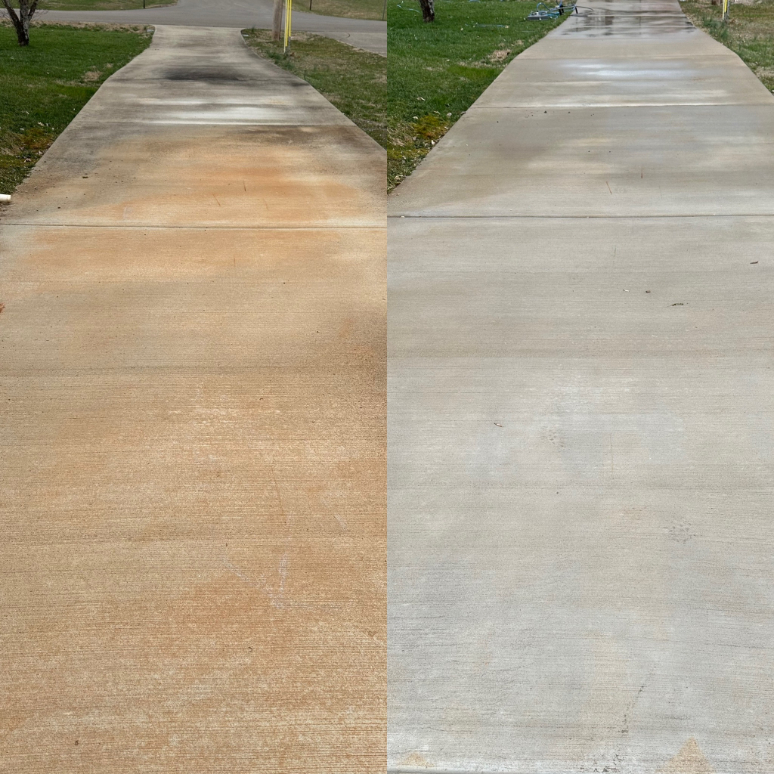Pressure Washing vs. Soft Washing: Choosing the Right Method for Your Exterior Cleaning Needs

In the realm of exterior cleaning, two methods stand out as powerful tools to rid surfaces of dirt, grime, and unsightly stains: pressure washing and soft washing. While they share the goal of rejuvenating your property's appearance, they differ significantly in technique and application. Understanding the distinctions between these methods can help you make an informed decision about which is best suited for your specific cleaning needs.
What is Pressure Washing?
Pressure washing, also known as power washing, utilizes highly pressurized water to blast away stubborn dirt, mold, mildew, and other contaminants from surfaces. The equipment typically includes a high-powered machine that pumps water at varying pressures, often exceeding 3000 PSI (pounds per square inch). This forceful stream of water effectively removes tough stains and debris from surfaces like driveways, sidewalks, decks, and siding.
The Benefits of Pressure Washing
Deep Cleaning Power:Pressure washing can penetrate deep into porous surfaces, thoroughly cleaning away embedded dirt and grime. Whether it's oil stains on your driveway or algae growth on your deck, pressure washing can restore surfaces to their original condition with ease.
Efficiency:It's a quick and efficient way to tackle large surface areas, making it ideal for high-traffic zones like driveways and walkways. With its high-pressure stream, pressure washing can cover expansive areas in a fraction of the time it would take with traditional cleaning methods, saving you both time and effort.
Versatility:Pressure washing can be used on a variety of surfaces, including concrete, brick, stone, and wood. Whether you're cleaning your home's exterior, preparing surfaces for painting, or removing graffiti, pressure washing can handle the job effectively.
What is Soft Washing?
Soft washing is a gentler alternative to pressure washing that utilizes a combination of low-pressure water and specialized cleaning solutions to remove dirt, algae, and mildew from surfaces. Unlike pressure washing, which relies solely on force, soft washing employs chemical cleaners to break down contaminants before rinsing them away with a low-pressure stream of water. This method is particularly effective for delicate surfaces, such as stucco, vinyl siding, and painted wood, where high pressure could cause damage.
The Benefits of Soft Washing
Gentle on Surfaces: Soft washing minimizes the risk of damage to delicate materials by using low-pressure water and specialized cleaning solutions. Unlike pressure washing, which can sometimes etch or strip surfaces, soft washing provides a gentle yet thorough clean that preserves the integrity of your property's exterior.
Effective Stain Removal:The chemical cleaners used in soft washing can effectively break down and remove tough stains, including algae and mildew, without the need for excessive force. By targeting the root cause of staining and contamination, soft washing ensures a thorough clean that lasts longer than traditional methods.
Longer Lasting Results:Soft washing not only cleans surfaces but also helps prevent the regrowth of algae and mildew, resulting in a cleaner appearance for a longer period. By treating surfaces with specialized cleaning solutions, soft washing creates a protective barrier that inhibits the growth of contaminants, keeping your property looking its best for years to come.
Choosing the Right Method
When deciding between pressure washing and soft washing for your exterior cleaning needs, consider the following factors:
Surface Material:If you're cleaning a robust surface like concrete or brick, pressure washing may be the most effective option. However, for more delicate surfaces like vinyl siding or painted wood, soft washing is likely the better choice. Soft washing ensures a thorough clean without the risk of damage to sensitive materials.
Level of Contamination:If your surfaces are heavily stained or infested with mold and mildew, pressure washing may be necessary to achieve a thorough clean. For lighter contamination or maintenance cleaning, soft washing can provide excellent results. By tailoring the cleaning method to the level of contamination, you can ensure optimal results with minimal effort.
Environmental Concerns:Soft washing is generally considered more environmentally friendly than pressure washing since it uses fewer resources and relies on biodegradable cleaning solutions. By choosing soft washing, you can minimize your environmental footprint while still achieving exceptional cleaning results. In conclusion, both pressure washing and soft washing are powerful tools for revitalizing your property's exterior. By understanding the differences between these methods and considering your specific cleaning needs, you can choose the right approach to achieve stunning results while preserving the integrity of your surfaces.
For professional assistance in pressure washing or soft washing your property, contact [Your Contractor Directory Website] today. Our network of experienced contractors is equipped with the expertise and equipment to tackle all your exterior cleaning needs with precision and care.
Featured Pressure Washing Contractors
Coastal Facility Maintenance - Alabama Pressure Washing Contractor
Ivan's Extreme Power Wash - Arkansas Pressure Washing Contractor
Magic Touch Exteriors - Arizona Pressure Washing Contractor